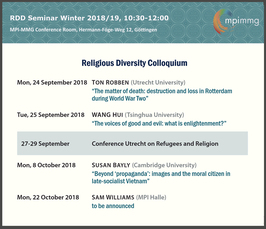"The matter of death: destruction and loss in Rotterdam during World War Two"
Religious Diversity Colloquium Winter 2018/19
- Datum: 24.09.2018
- Uhrzeit: 10:30 - 12:00
- Vortragende(r): Ton Robben (Utrecht University)
- Antonius C.G.M. Robben is Professor of Anthropology at Utrecht University, the Netherlands, and past President of the Netherlands Society of Anthropology. He received a Ph.D. (1986) from the University of California, Berkeley, and has been a research fellow at the Michigan Society of Fellows, Ann Arbor, the Harry Frank Guggenheim Foundation, New York, and the David Rockefeller Center, Harvard University. His monographs include Political Violence and Trauma in Argentina (2005), which won the Textor Prize from the American Anthropological Association in 2006 for Excellence in Anthropology, and Argentina Betrayed: Memory, Mourning, and Accountability (2018). His most recent edited volumes are Necropolitics: Mass Graves and Exhumations in the Age of Human Rights (2015; co-edited with Francisco Ferrándiz), Death, Mourning, and Burial: A Cross-Cultural Reader (2017, 2nd ed.), and A Companion to the Anthropology of Death (2018).
- Ort: MPI-MMG, Hermann-Föge-Weg 12, Göttingen
- Raum: Conference Room

For more details please contact vdvoffice(at)mmg.mpg.de.
This lecture analyzes the death of thousands of bombing victims in Rotterdam during World war Two as the co-constitution of civil defense shelters and their occupants. The construction of air raid shelters was initiated by Rotterdam’s authorities in the years preceding the German invasion of the Netherlands in May 1940. People’s lives and shelters were further forged under German occupation as Allied bombers attacked their military installations. How did people shield themselves from the bombardments? How did residents come to their end, and what happened to their remains? I argue that the intertwinement of the material and human agency of shelters and civilians co-constituted death in Rotterdam, and conclude that the study of massive violence should focus as much on the means of death as on the measures to protect life.